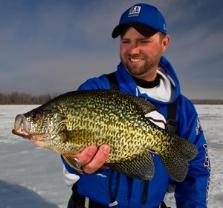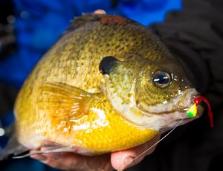Finessing Aggressive Panfish
By: Matt Johnson
Excuse me? Finessing an aggressive fish,
huh? I suppose you’re wondering what that
even means and why I’m titling this article
in a manner that would contradict itself.
Well, believe it or not, but even
aggressive-natured fish need a little
coaxing at times. Even though the fish are
aggressive, it doesn’t mean they want to
eat big baits sprinting through the water.
Sometimes fish prefer smaller baits, even
though they are in a highly aggressive mood. This is where targeting
aggressive fish with finesse presentations comes into play.
So just how do we determine they aggressive fish that need to be teased with
finesse applications? That’s a very fair question. I look to my Vexilar flasher. It’s
amazing what your electronics will tell you. You can see when fish crash the bait
only to halt upon impact, moments before striking. This tells me we’re dealing
with aggressive-natured fish but the offering didn’t seal the deal. Sometimes it’s
because the bait is too large, not the right action, looks awkward, it could be a
number of things. To me, I turn on my finessing aggressive fish switch. I move
into finesse mode with the mindset that the fish I’m dealing with are eager to
chase, but they just need a little coaxing. Enter the realm of finesse plastics and
tungsten jigs.
Why this combo you might ask? Well, as we’re taught in recent years, tungsten
allows us to fish smaller and faster. Now I can deploy a smaller profiled jig but
launch it down in deeper water, or punch it through surface slush and even
weeds where fish hide. I’ve now equipped myself with the ultimate delivery
system to finesse aggressive panfish. Now couple that with a subtle, tantalizing
plastic tail and you have yourself a dynamite combo. You can work all depths
and at just about any speed, allowing you to approach aggressive fish that
prefer a smaller meal—presented in a more life-like manner.
Tungsten has allowed us to truly attack a pod of fish with the proper bait-profile
that the fish want. In the past, we would use small jigging spoons or larger
panfish jigs to get the desired outcome. However, those “larger” baits didn’t
always seal the deal, even on aggressive fish. Now we can pick off these
aggressive fish with a smaller presentation and continue to fish fast and
effective. Tungsten truly improves our productivity and offers that versatile
option for seeing positive results for a variety of fish behaviors and activity
levels.

My go-to presentations for finessing these
aggressive fish consists of size 10 and 12
tungsten jigs. I prefer the Drop Series from
Clam Pro Tackle, particularly the Drop and
the Dingle Drop. The new XL versions
have earned a starting spot in my line-up
as well. The larger hook allows me to
maximize the use — and hooking
percentage—when coupling it with finesse
plastic. Color doesn’t p lay a huge role to
me; I’m more concerned about action and
profile. I then tip these jigs with a Maki Mino, Maki Spiiki or Maki Draggi. I feel
these three styles give me the versatility needed to offer just about any profile
or action. NOTE: You can change the action and profile of the plastic by simply
tearing off a tail or shortening the body. I will do that quote often to get the
desired result. So even though I only listed three options of finesse plastics, I
can turn each of those into something totally different by a slight modification.
We’ve all experienced those bites where you can do nothing wrong, and
everything you drop down the hole gets bit. We’ve also experienced those bites
where you can do nothing right, and no matter what you drop down the hole
you won’t get a bite. Teaching yourself to try different techniques depending on
the mood of the fish can really change your success. The presentations
mentioned in this article have quite a bit of versatility, and you will find yourself
building confidence with finesse plastics as you encounter these aggressive
bites. There is nothing more frustrating when a fish comes scorching in on your
Vexilar only to have it stop at the bait and do nothing. Try the technique of
dropping down a small—yet aggressive—presentation the next time you
encounter that situation and get ready to set the hook!
Good Fishing,
Matt Johnson
